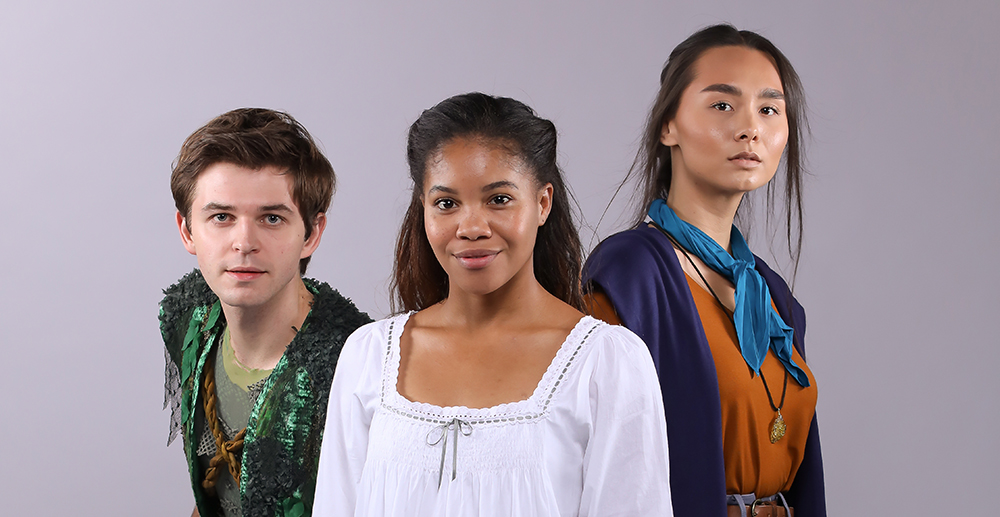Culture
 (Left to right) Justin Mark, Sinclair Daniel and Isabella Star LaBlanc // Photo: Tony Powell
(Left to right) Justin Mark, Sinclair Daniel and Isabella Star LaBlanc // Photo: Tony Powell
The Story Of Peter Pan: From Beloved Classic To Contemporary Spectacle
December 2, 2019 @ 12:00am
Director Alan Paul likes to go big. Shakespeare Theatre Company’s (STC) associate artistic director has made a name for himself directing musicals and operas notable for their grand scale and lush scope. That experience will come in handy this winter as Paul tackles his biggest project yet: a re-envisioning of J.M. Barrie’s Peter Pan, at STC’s Sidney Harman Hall from December 3 through January 12.
Peter Pan and Wendy will feature a fresh new script by playwright Lauren Gunderson, a cast of 20 and a creative team of 66 that will bring Peter Pan’s story to life through special effects, flying and ambitious sets. It is bigger than anything the company has produced before, and it’s all in Paul’s hands.
“I don’t feel like the director of this show,” Paul told me during an interview at STC’s rehearsal space last week. “I feel like the captain of the ship, like I’m orchestrating 50 people doing a million things, which I am.”
Paul envisions a show that is grand in both ideas and design. His team includes a roster of A-list artists including Gunderson, currently the most frequently produced playwright in America (American Theatre magazine), and Emmy Award-winning scenic designer Jason Sherwood (Fox’s Rent Live), who is tasked with creating the worlds of the Darling family nursery, Neverland and more.
Gunderson’s script calls for dazzling effects: flying bunk beds, midair fight sequences, Tinkerbell transforming from light to human and pirates tumbling from their ship while a giant crocodile lurks below, to name but a few. It also includes the familiar Peter Pan storyline – with some twists.
“Peter Pan already has his story,” Paul said. “The pull of it for me was Wendy and what happens to her. This is Wendy’s story, from start to finish.”
Paul felt that Gunderson, known for her plays that put women – often neglected historical figures – center stage, was the perfect person to develop a “robust, swashbuckling adventure” led by a smart, inquisitive heroine.
“There were a lot of people out there who could have written a post-modern riff on Peter Pan, but not in a big, crowd-pleasing, robust way. And that was the charge I had for her. It had to be robust.”
And it had to have the women take charge. Paul hopes Peter Pan and Wendy will do for theatre what Frozen did for movies: rewrite the rules and prove that female-driven adventure stories can attract large audiences.
Rewriting the rules “is the whole point, actually,” Paul said. “In the original Peter Pan, Peter wants to bring Wendy to Neverland to sew their socks and mend their buttons. That feels very different in 2019.”
In Gunderson’s version, Wendy is a budding scientist whose role model is Marie Curie, the Nobel Prize-winning physicist and chemist who won her first Nobel Prize in 1903.
“Peter Pan was written in 1904, so we thought this was a great example of a very strong, very famous woman that Wendy could aspire to be.”
Wendy is joined by Tiger Lily, the Native American character that many productions of the still-popular 1954 Peter Pan musical cut due to its offensive characterization. In approaching the parts of the original story that may seem sexist or racist, Paul felt his and Gunderson’s job “was not to be apologetic, but to actively flip the script.” Rather than eliminating the Tiger Lily character, they wanted to make her voice powerful and real. She is now a driving force in Peter Pan and Wendy, a vocal sparring partner with Pan, and a leader in Neverland.
Paul enjoys mining the deep psychological undercurrents in the script.
“This is a play that is obsessed with time,” he observed, noting that Peter Pan and Captain Hook are both trying to stop the clock and avoid the inevitability of aging. “It’s not a subtle play. It’s about good and evil and a bunch of boys fighting off pirates and a girl who believes in science. The stakes are really high. These kids go to Neverland to discover who they are and to see the worst of the world. They come back having learned big things.”
The story plays out in five separate sets, each of them designed to dazzle by Jason Sherwood.
“When you do Peter Pan, you can either do Peter and the Starcatcher, which is a very slimmed down version, or you just go ‘Boom!” Paul said. “And I was like ‘Jason, it’s time for big scenery. It’s what people want. People want an adventure.’”
In his approach to scenic design, Paul draws from his experiences directing opera. He recalls advice he once received from Sir Nicholas Hytner, the former artistic director of London’s National Theatre.
“The secret to opera is that you have to create five images the audience will find spectacular,” Paul recalls Hytner saying.
That can be a set piece, like the pirate ship that makes an entrance in Peter Pan and Wendy’s fifth act.
“We played around with simple designs for the ship, but then I thought, ‘People are waiting for that pirate ship to show up. It needs to be great.’”
Or it can be a scene. Paul thinks the opening sequence in which Pan reunites with his shadow will be spectacular. He hopes that a scene featuring an aerialist mermaid in a sea cave will be a beautifully stark and memorable contrast to the rest of the show.
STC commissioned Peter Pan and Wendy as the first offering in artistic director Simon Godwin’s holiday family-friendly initiative. But Godwin and Paul believe Peter Pan and Wendy will speak to adults and children equally. Paul knows it is the visual splendor that will wow young audiences, but he also thinks back to the opening night of J.M. Barrie’s original 1904 play.
“The audience that night was full of adults. Adults keep coming back to this old play from 1904 because there is really something to it. We had to find a way to honor that and make it about really contemporary things.”
Don’t miss Peter Pan and Wendy at STC from December 3 to January 12. Times vary. Tickets are $35-$120. Learn more and purchase tickets at www.shakespearetheatre.org.
STC’s Sidney Harman Hall: 610 F St. NW, DC; 202-547-1122; www.shakespearetheatre.org








